How to ensure the safety of breastmilk and infant formulas?
 20693
20693
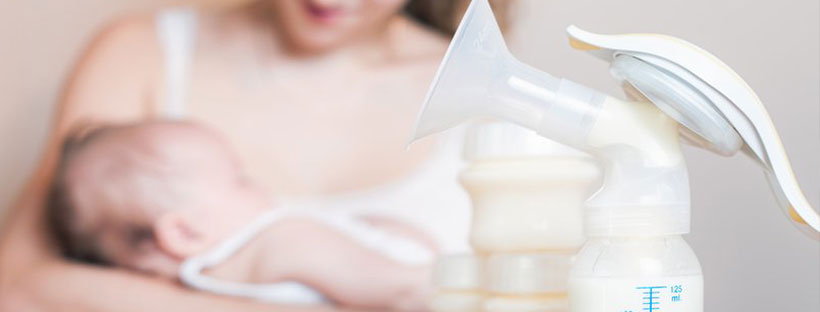
super easy
Do you want to know how you can breastfeed your baby safe when you are not around? Are you a new mother who is clueless about the safe preparation and handling of infant formula? Don’t worry. You are in the right place. As a mother, all you want is the safe and healthy nurturing of your little one. Your baby is precious and delicate, so his or her immune system. Therefore, the quality and safety of breastmilk or formula you feed to your baby play a major role.
But your professional and personal life demands may make it very challenging for you to self-learn everything about your baby food. You may be wondering how to ensure you are preparing and storing the milk or infant formula safely.
Do not worry! In this blog, I will explain how you can feed your baby without compromising safety and quality. If you follow these tips and guidelines, no one can stop you from having a ‘good night sleep’ daily unless your baby allows you to do so 😉
If you are Expressing your Breast Milk
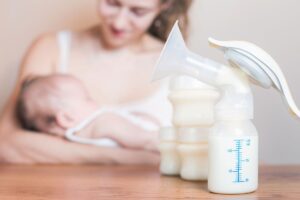
Image source: www.abm.me.uk
“Breastfeeding reminds us of the universal truth of abundance; the more we give out, the more we are filled up, and that divine nourishment, the source from which we all draw is, like a mother’s breast, ever full and ever-flowing. – Sara Buckley.
Yes, Breastfeeding is overall, divine nourishment and immune protection you provide to your own blood. If you are planning to express your breastmilk, then first let me tell you what exactly expressing means and how you can do it safely.
Expressing breast milk means squeezing the milk out of your breasts. This helps you to store and feed your baby later. This process helps if you have to be away from your baby due to work or your breasts are full. You can express it using breast pumps.
Following are the few safety tips you should follow if you are expressing your breastmilk.
- Before expressing the milk, make sure you wash and dry your hands. Sterilize the equipment and containers using steam to prevent contamination.
- The container used for storing the breastmilk must be sterile. It also should be food-grade and must have airtight lids to prevent contamination. Do not forget to label the container with the date of expressing.
- You can store the expressed milk in the refrigerator for up to 48 hours and in the freezer until three months. Make sure you do not store it in the door of the fridge or freezer. This may cause temperature fluctuation in the milk.
- You have to thaw or defrost the breastmilk using the refrigerator and use it within 24 hours.
- If you want to rewarm the milk, keep it in the shallow container with hot water for not more than 15 minutes. Do not overheat it, as it affects the immunological properties of breast milk.
- Can you warm or heat the expressed breastmilk using a microwave? No, it is not recommended as it results in uneven heating. The overheated part of the milk may burn your baby’s mouth.
- Is it okay if you refreeze the expressed breastmilk? No, it reduces the quality and safety of the milk. If you keep the milk unattended at room temperature for more than 4 hours, then the only option left is to discard it.
- If you are using a breast pump to express the breastmilk, make sure you clean and sterilize it. Follow the instructions provided by the manufacturer for the same.
Infant Formula preparation and its Safe handling

Image source: www.happyfamilyorganics.com
- Do you have a habit of checking the labeling on infant formula packaging? If not, make a habit. It is important to make sure it is in usable condition. Follow the storage and preparation instructions to make the best use of it.
- Make sure you use washed and sterilized baby bottles and nipples (The sterilization process will be explained later in detail). This is to prevent contamination. The quality of water that you use in the formula preparation is also important. Always use the boiled water and make sure you cool down its temperature before use.
- If you are facing a lack of time, then you can prepare and refrigerate the formula for about 24 hours. But it is always recommended to prepare fresh every day.
- Always warm the baby bottles containing formula using hot water. Do not go for the microwave heating. This results in varying temperatures and may burn your baby’s delicate mouth!
The Type of Baby Bottles also Matters!
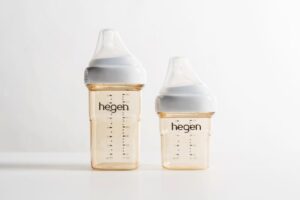
Image source: redtri.com
Feeding bottles are very crucial for your baby. The optimal health of your little one also depends on the type of feeding bottles you use. Most of the feeding bottles contain a chemical compound called BPA (Bisphenol A). It is the building block of certain types of plastics. Researchers say that this chemical acts as a hormone. There are also claims that this disrupts the normal functioning of your baby’s hormones.
The effects of exposure of BPA to the pre-born, infants, and young children are still under study. But, the Department of Health and Human Services of the USA has recommended a few steps. These will help you in reducing the exposure of BPA to your baby.
- Make use of BPA-free baby bottles and cups, which are available in the market worldwide.
- Do not use the bottles which have scratches, are old, and contains BPA.
- How can you prepare the infant formula with safety? Here it is. Do not put the hot steaming liquids that have to mix with the formula into BPA containing bottles. Make sure you use the BPA free containers to prepare the formula. Check the formula for its temperature before you fill it in the bottles.
- If you are using ready to feed liquid formula, then do not heat the cans of these formulae on the stove. Do not heat these in boiling water either. You can feed this at room temperature itself. If you want to warm it a bit, run the warm water over the outside of the bottle.
- If used milk remains in the bottle, can you store and reuse it? No, discard it immediately. This is because the bacterias from the mouth of your baby grow and multiply in the milk during storage, making it unsuitable to use it later.
- Do not feed the prepared formula to your baby if it has been kept unused for more than 24 hours.
- If the containers of ready to feed or concentrated formulas are kept open for more than 48 hours, discard it.
What about the containers used for food preparation? Same as feeding bottles, always go for the non-plastic containers. American Association of Pediatrics recommends avoiding plastic containers. Check for PC or recycling number 7 on containers or feeding bottles. This is because most of these contain BPA. But there are opaque plastic bottles with recycling numbers 2 and 5, which usually do not contain BPA.
You cannot Ignore the Safe handling of Baby bottles.
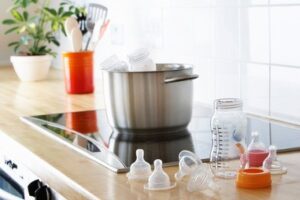
Image source: www.pregnancybirthbaby.org
- Is it enough if you wash and use the baby bottles, caps, and nipples? No. You have to sterilize it using boiling water for five minutes or more before filling. Follow this at least for the first three months.
- There are different types of sterilizing equipment and tablets available in the market. These are effective provided you follow the instructions of the manufacturer. The sterilizing solutions remain effective till 24 hours.
- If you want to sterilize the equipment, use boiling water. If you have a dishwasher, its sanitizing temperature must be 165 °F or more. Make sure you check the equipment manual while setting up the sanitizing temperature.
- Do not use the microwave to sanitize the baby bottles. Microwave heating causes uneven heating. This results in hot spots that may burn your baby’s mouth.
- After the cleaning and sterilization process, keep the bottles for cooling down. Later fill it with milk or infant formula. Now you are good to go. 😊
Hand Hygiene is very Crucial.
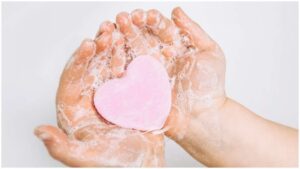
Image source: www.dnaindia.com
You may be handling the milk, formula, and feeding bottles safely. But what if you do not maintain your hand hygiene? There is no point, isn’t it? Your hands can be potential carriers of harmful bacterias. This contamination may take place during your many household works. These include handling raw meat, poultry, eggs, raw vegetables, fruits. Thus, you need to maintain hand hygiene to keep your baby safe. You can do this with the simple hand wash process!
- Use warm water to wet your hands and apply soap.
- Scrub your hands, fingers, wrists, between fingers, fingernails, tips for about 20 seconds.
- Rinse using water and dry using a cloth or paper towel.
Now you can prepare formula, play around, or care for your kid without any worries!
I am sure after reading this, you have turned into a more aware and more confident mother. Nurturing your baby is not an easy job. It is essential to consider the safety of milk or formula along with the nutrition and quality aspects. I hope this piece of content helped you to understand the importance of safety and how to ensure it while feeding your little bundle of joy.





Leave a Reply